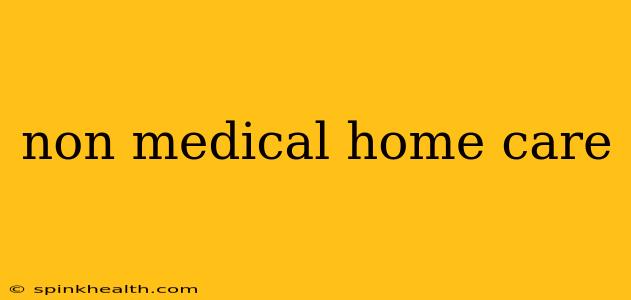The gentle hum of a familiar song playing softly on the radio, the comforting scent of freshly brewed coffee, the warmth of a friendly face – these are the hallmarks of home. But as we age or face illness or disability, maintaining the independence and comfort of home can become challenging. This is where non-medical home care steps in, offering a lifeline of support and assistance that allows individuals to remain in the place they love most. Let's explore this vital service.
What Exactly is Non-Medical Home Care?
Non-medical home care provides assistance with daily living activities, but it doesn't involve medical treatments or nursing care. Think of it as personalized support tailored to individual needs, helping people maintain their dignity, independence, and quality of life within the familiar setting of their own homes. This support can range from companionship and meal preparation to help with bathing and dressing.
What Services Does Non-Medical Home Care Offer?
This is where the real personalization shines. Non-medical home care agencies offer a wide spectrum of services, often customizable to meet specific needs.
Personal Care:
This includes assistance with activities of daily living (ADLs) such as bathing, dressing, grooming, toileting, and eating. Caregivers provide hands-on support while respecting the individual's dignity and independence.
Household Chores:
Maintaining a home can be strenuous. Non-medical home care can include light housekeeping, laundry, meal preparation, grocery shopping, and running errands. This frees up time and energy for the individual to focus on other aspects of their life.
Companionship and Socialization:
Loneliness can be a significant issue for many, particularly seniors. Caregivers provide companionship, engaging in conversation, playing games, reading aloud, and assisting with social activities. This combats isolation and promotes emotional well-being.
Transportation:
Getting to appointments, social events, or simply running errands can be a challenge for some. Non-medical home care can include transportation services, ensuring individuals maintain their connection to the community.
Medication Reminders:
While not administering medication, caregivers can play a crucial role in reminding individuals to take their prescribed medications, ensuring adherence to treatment plans.
What are the Benefits of Non-Medical Home Care?
The advantages extend far beyond mere convenience.
- Improved Quality of Life: Remaining at home in familiar surroundings significantly enhances emotional well-being and reduces stress.
- Enhanced Independence: Individuals retain control over their lives and maintain their dignity.
- Reduced Hospitalizations: Proactive support can prevent falls, injuries, and other complications that might lead to hospital stays.
- Peace of Mind for Families: Knowing a loved one is receiving the necessary support provides families with peace of mind.
- Cost-Effective: In many cases, home care is a more affordable alternative to assisted living or nursing homes.
How Much Does Non-Medical Home Care Cost?
The cost of non-medical home care varies significantly based on location, the level of care required, and the number of hours of service. It’s crucial to obtain quotes from several agencies to compare pricing and services.
How Do I Find a Reputable Non-Medical Home Care Agency?
Choosing the right agency is paramount. Look for agencies with:
- Licensed and Bonded Caregivers: Ensuring caregivers are properly vetted and insured is essential for safety and peace of mind.
- Positive Reviews and Testimonials: Check online reviews and ask for references.
- Clear Pricing and Contracts: Understand the costs and terms of service upfront.
- Comprehensive Assessment Process: A thorough assessment ensures the care plan aligns with the individual's specific needs.
Is Non-Medical Home Care Right for Me or My Loved One?
If you or a loved one is struggling with daily tasks, experiencing loneliness, or needs assistance to remain safely at home, non-medical home care could be the perfect solution. It's about preserving independence, dignity, and the comfort of home. A conversation with a home care agency can help determine the appropriate level of support.
This comprehensive approach to non-medical home care provides a clear understanding of the services, benefits, and considerations involved. Remember to always conduct thorough research and choose a reputable agency to ensure the best possible care for yourself or your loved one.

